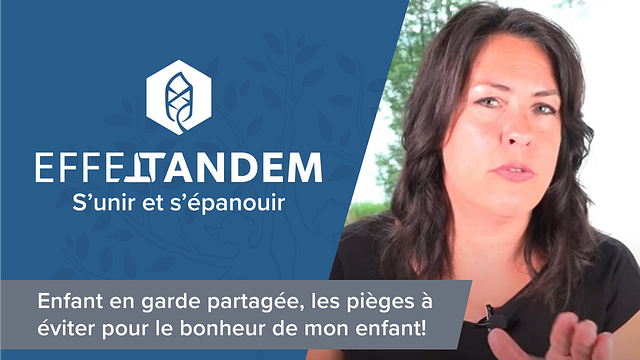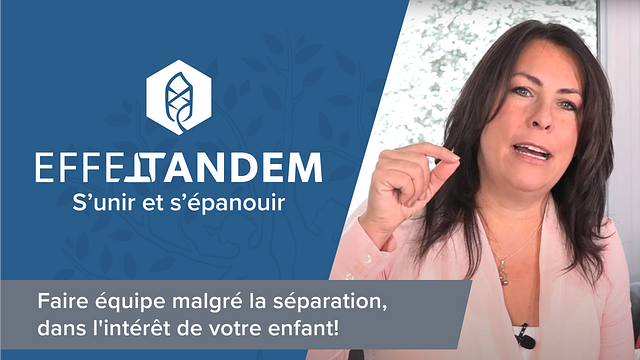You are a separated parent and when it's time for your children to go to the other parent's house, they don't want to go, they cry, they don't feel like it. Or, when they are at the other parent's house, they say they miss you a lot. What do we do with that?
Hello. My name is Nancy Doyon, I am a special educator, family coach, author and speaker. I'm here to help you have better family relationships. First of all, as in everything I say, I always have a sort of "it depends". What do we do if my child doesn't want to go to the other parent's house? Do I let him not go or do I force him to go? What do I say? Like everything else I do, there is "it depends". It depends on a lot of things. It depends on the age of the child. You will understand that a 13 year old child who doesn't want to go to the other parent's house may have a little more veto power than a 3 year old. It also depends on the relationship I have with the ex. If I know that my ex, the other parent of these children, has inadequate educational methods and that the children are afraid of the other parent, perhaps I will put a little more pressure on them to go less often, perhaps I will report the matter to the youth protection agency, perhaps I will put my lawyer on the case so that contact is supervised a little more.
Now, in the case where you have standard children and your ex is a not so bad parent, who is not perfect, our exes are never perfect, but that despite everything your child tends to be glued to you and not want to go to the other, I invite you to see and think about "yes, but why he doesn't want to go?" Try to investigate a little. Does my child not want to go because at the other parent's house he is bored, maybe the other parent doesn't have enough toys or maybe doesn't do enough activities? Maybe we can come to an agreement with the other parent or with the child so that he can bring toys from home to the other place. It can also be the separation from his parent, who may be his primary attachment figure, that can be difficult. Unfortunately, it's often the dads who get the short end of the stick and the kids don't really want to go to their house because they are sometimes more attached to their mom. Sometimes it's the other way around. But it's more often the moms that the kids want to be with. Has the child developed a sufficient attachment with the other parent? Does the other parent know him/her well? If the attachment may not have been sufficiently developed, the child needs to spend time with dad or the other parent in order to develop that attachment. The other parent may need support to develop the attachment bond.
At the same time, I would tell you that often, around the age of 7, 8, 9, even sometimes 6, but I find that really a bubble at the 7-8 level, it happens quite often to children who are going through that period that they want to be fusional with mom or with one of the two parents and reject the other. Why do they do this? Because they are often in the black and white. They are very likely to say, "If I feel more comfortable with my mom, that means I'm not comfortable with my dad. At that point, I think it's important that we invite children to say "even if you're less comfortable with dad, even if you're less close to dad, it doesn't mean that you're bad, just survive it, survive the boredom".
We will also try to see if there are things that I, as a parent, say or do that could fuel a kind of conflict of loyalty in my child? What do I mean by this? When my child is with the other parent, in this case the father, does my child feel that he is betraying me? Does my child feel like he is abandoning me? It sounds trivial, but often, like Mom, if I say to my child "bye bye, my beautiful love, have a nice week at Dad's, Mom will miss you", I feel like I'm saying to my child "I love you and I care about you", but in my child, what it can create is the impression "oh my God, I'm not nice to go and have fun at Dad's, poor Mom, I'm abandoning her, I'm leaving her all alone. If that's what it is, what I'm going to encourage you to do a lot of is to say "you go to dad's house, listen, have fun, my beautiful love, I'm going to take advantage of it to do such and such a thing, such and such a thing. Have fun! See you soon. So to de-dramatize the moment of separation.
Many parents also, with the best intentions in the world, wanting to keep the link, if the child is a week at dad's, call him every day, send him a little text message, a little picture every day. With some children, this is not a problem. But with others, it's like when they're at dad's, they're never at dad's because the bond with mom doesn't come off. If that's it, then I encourage you, if your child is experiencing discomfort, to agree to one meeting a week, or two at the most, one or two phones, one or two texts, but let your child move in with the other parent.
The other trap that a lot of separated parents fall into is that when the child comes in, they are given a questionnaire. What did you do at your father's house? Was his girlfriend there? Were his girlfriend's children there? Do you get along with them? What activities did you do? Sometimes it puts a kind of pressure on the child. Maybe my mom would like it better if I didn't have too much fun at my dad's house. Maybe my mother would be happier if I told her that my father's house is ugly. At that point, we also feed that feeling. When the child comes back, "how did it go?", "I had a great week", "great, I'm happy!" But we don't put too many questions to our children.
❄️ Keep warm this winter: Enjoy a 50% discount on your 6-month subscription and join our community of serious and verified singles ready to share unforgettable encounters right now! 💖






